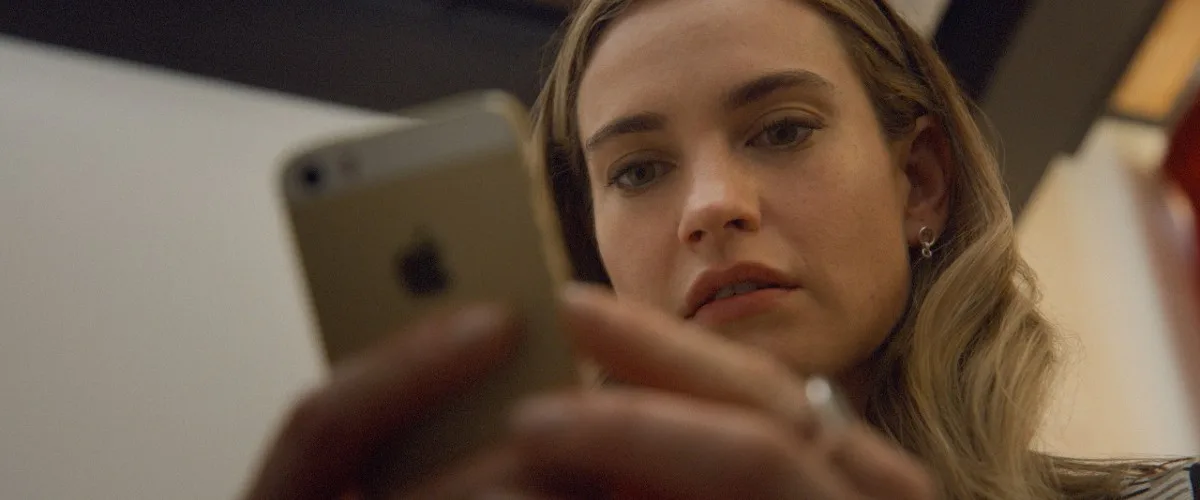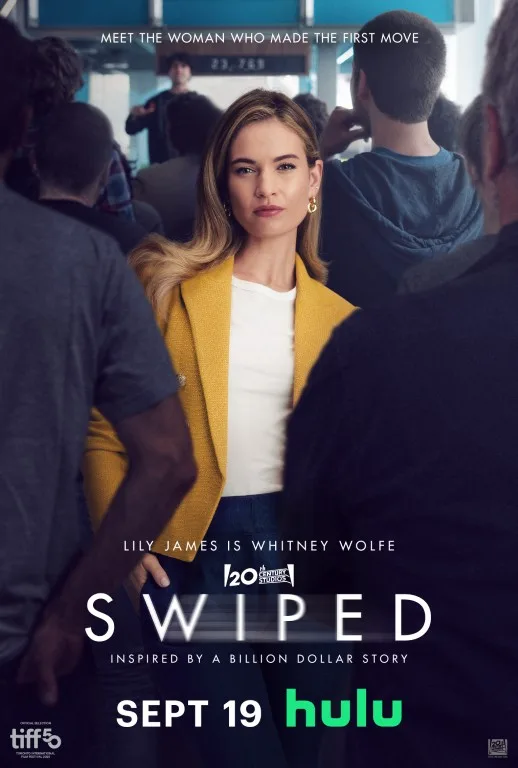After too much time swiping, looking at the endless stream of dating profiles can start to blur. And after so many corporate biopics, it can feel like swiping through various Forbes articles. Nonetheless, Rachel Lee Goldenberg’s “Swiped” is an interesting case study. Although its story beats are familiar (following the rise and scandal of a brand name), many people have come to know it as part of their daily lives. From “The Social Network” to a mini series like “Super Pumped: The Battle for Uber,” the charmingly funny “BlackBerry,” and other tech-centric contenders like “Tetris” or “Steve Jobs,” the majority of stories from this industry are about the men who made a difference in the world. “Swiped” is about an ambitious woman who thought outside the box.
When “Swiped” begins, Whitney Wolfe (Lily James) is on a mission. Sneaking into an event full of venture capital guys, she tries pitching them her idea for a business that will match volunteers with charities. By chance, she lands a quick encounter with Sean Rad (Ben Schnetzer), one of many would-be entrepreneurs, and gets his attention. He invites her to sideline her altruistic idea and join his company at Hatch Labs, which is currently trying to pitch a half-baked rewards points scheme and a fledgling dating app she christens Tinder. With the help of a coworker, Tisha (Myha’la), Whitney launches an ambitious marketing campaign, which catches fire on college campuses through Tinder.
At the same time she’s finding success, she’s juggling a toxic relationship with one of the heads of the company, Justin Mateen (Jackson White). When his workplace harassment intensifies, Whitney finds herself pushed out of the company she helped build with a very costly lawsuit. Just when things seemed at their lowest, another enterprising investor, Andrey Andreev (Dan Stevens), makes her an offer to create a dating app on her own terms, focusing on women’s experiences on the app, and Whitney launches Bumble to great success—if only she can weather the storm of yet another scandal to come.
Written by Goldenberg, Bill Parker, and Kim Caramele, “Swiped” is a corporate girl-power biopic with a well-tread narrative. Creator hits a roadblock, creator continues to innovate, until the next roadblock, rinse, repeat. It’s a packaged story built out of what’s publicly known about Whitney’s story because she’s under a nondisclosure agreement and can’t publicly speak out about her time there. The main characters seem more like shorthand caricatures: menacing boyfriend, uninterested boss. As Whitney, James has the most room to grow, and her performance takes the audience through her character’s journey of a bright-eyed upstart to a cautious but principled businesswoman, who, despite her young age, understands the impact of her work on women.
What’s interesting about “Swiped” is that to discuss Whitney Wolfe (now Whitney Wolfe Herd) is to examine the toxic nature of the VC world and its boys’ club mentality. In the years leading up to the #MeToo movement, little attention would be paid to women fighting workplace sexual harassment, and indeed, it plays out to be more of a detriment to Wolfe than Mateen. In smaller, but no less significant moments, the women of Tinder found themselves tasked with menial, thankless jobs compared to the men, and raised concerns that the company didn’t care about the safety of its women users. These are vital, ongoing conversations sometimes awkwardly shoehorned into a movie that’s also celebrating her marketing genius. These moments are direct and plain, not quite presented in a unique or thought-provoking way, like the manner in which Kitty Green’s “The Assistant” showed the day in the life of someone navigating workplace harassment in the entertainment industry.
With an extensive TV background that includes shows like “The Mindy Project,” “Everything’s Gonna Be Okay,” and “Minx,” Goldenberg’s film “Swiped” fits neatly into its runtime—short, sweet, and to the point. It feels strangely simplistic for a story that’s notoriously messy, with every guy, including Justin, Sean, and Andrey, playing various shades of misogynist villains, and every woman on board with the cause of girl power once Whitney sees what’s happening to her. Championing equality in the workplace is a great message.
At a time when it seems like women’s representation seems to be regressing, the intention of the film feels more timely now than when the film ends in 2019, before the pandemic, and the fondness for dating apps starts to wear off. But it was the user experience of the film—where its simplistic narrative design leaves no surprises and plenty of shallow characters—that felt unsatisfying.




















